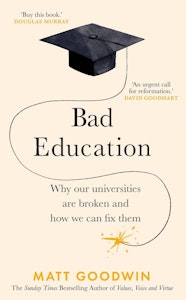This article is taken from the April 2025 issue of The Critic. To get the full magazine why not subscribe? Right now we’re offering five issues for just £10.
Quid est veritas? That crucial question of “what is truth?” underpins Matt Goodwin’s incisive diagnosis of just what is going wrong in universities as once-hallowed institutions stray farther from pursuing — let alone asking — this question.
While some may dismiss Bad Education as a one-man polemic, this concise, public-facing work offers a pithy dissection of the political, social and financial issues afflicting academia. This book is essential reading for those who think that freedom of speech and academic freedom are not currently under threat.
Universities have long been notorious for leaning left, but the present imbalance would make John Henry Newman — author of The Idea of a University —shudder. Instead of being hubs of vigorous debate, universities are now colonised by an insidious ideology, driven by the unholy trinity of “Equality, Diversity, and Inclusion” (EDI). Debate is usurped by dogma, viewpoint diversity replaced by “decolonisation” of syllabuses, academia overshadowed by activism.
Universities should not be echo chambers of cancellation
As Goodwin notes, these changes are in part caused by an ever-expanding and politicised bureaucracy of activists inculcating an environment of fear instead of discourse. Staff and students shy away from expressing their own views for fear of “cancellation”, especially if they oppose the tenets of critical (race) theory — the calls to dismantle white privilege or self-flagellate for the West’s imperial past.
All these developments raise the question of just whom the contemporary university serves. One thing is for sure: it is neither those students nor
those academic staff dedicated to excellence in teaching and research. The politicisation of the university has been compounded by the infantilisation of student education. As lecture attendance becomes akin to watching BBC iPlayer, coursework replaces rigorous examinations and grade inflation rides rampant, hopes of cultivating the critical thinkers of the future are a mere pipe dream.
As Goodwin reminds us, a key problem is the corruption of hiring practices for university staff, as job selection committees prioritise the ability of a candidate’s research to conform with EDI agendas over their ability to fulfil the duties of the role. As ideologically-minded academics hire members of their own tribe, these individuals will want to “decolonise” syllabuses, call for greater adherence to EDI policies — and will themselves rise to senior positions. The inevitable result is educational decline.
Goodwin’s concerns are warranted at a time when universities are being ruled by a combination of a greed for cash coupled with the mission creep of a monoculture that was once a radical minority. As EDI units expand, contrary to universities’ much-touted “budgetary constraints”, it is not only free speech on tenterhooks but also the fundamental goal of any university: to teach students how — not what — to think.

Naysayers may bray that Goodwin’s arguments are fabrications of his “unconscious bias” as an academic within the social sciences, a field we both share. It is harder, though not impossible, to “decolonise” string theory than the study of international relations. Yet for all these interdisciplinary differences, the broader insidious culture pervading universities in the post-Brexit and post-George Floyd eras cannot be ignored. Concerningly, but not surprisingly, universities remain one of the only sectors yet to reach “peak woke”.
Bad Education appears at a time when academic institutions are being increasingly undermined by actors from within, as well as from on high. The Research Excellence Framework, which allegedly assesses the quality of university research, has been hijacked — with “outputs” now given greater scrutiny for their conformity with EDI. What is more, as the Starmer government seeks to “diversify” school curriculums by erasing so-called “Western-centric” texts while culling funding for its state-school Latin scheme, it’s more timely than ever to ask: Quo vadimus?
Goodwin offers us here a clear manifesto for making academia great again. While greater dialogue is good, it is not enough. More radically, now is the time for institutional neutrality, for the erasure of EDI as a criterion in selecting candidates for academic posts and for the enshrining of legal protection for those people —academics and students — who go against the grain.
Although the road ahead is long and difficult, elite institutions must lead the way in refusing to cave to pressures from within. Universities should be academically demanding, rigorous institutions where the most difficult questions are asked — not echo chambers of cancellation. Otherwise, there will be very little point in going to university at all.







